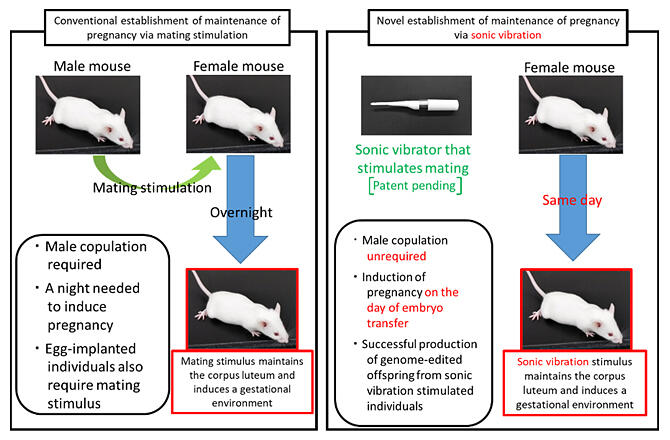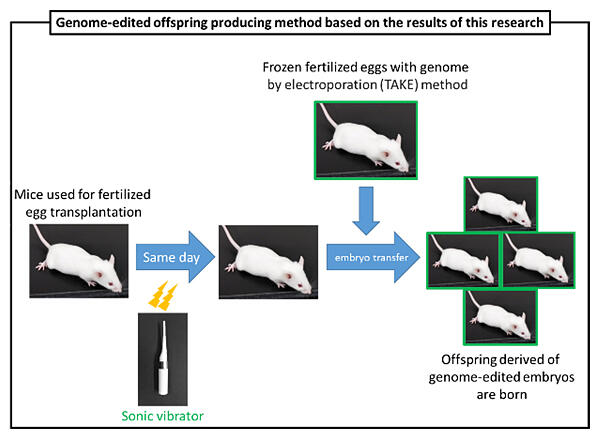The joint research group led by Associate Professor Takehito Kaneko of the Faculty of Science and Engineering, Iwate University, and the Institute for Animal Reproduction announced the development of a technology for creating an environment for the maintenance of pregnancy in mice. They used sonic vibrations to reproduce the male mating‐stimulus necessary to maintain corpus luteum function in rodents. The researchers improved the original device developed in 2020 for rats.
Genetically modified offspring were produced normally when frozen fertilized eggs, the genomes of which were edited using the TAKE method, were transplanted into female mice in estrus stimulated using the improved apparatus. The group is aiming to commercialize and release the product within this year. The product is expected to lead to efficient laboratory animal production and improved animal welfare. The results were published in an international academic journal Scientific Reports on March 3, 2023.


New method (above right): Establishment of pregnancy by maintenance of the corpus luteum derived from sonic vibration.
(Bottom) Genome‐edited mice were produced via transfer of frozen‐warmed embryos (TAKE method (electroporation)) into sonic vibration pseudopregnancy induced females.
Provided by Takehito Kaneko, Iwate Univ.
The maintenance of pregnancy in animals, including in humans, requires the corpus luteum to form after ovulation. In rodents, such as mice, the formed corpus luteum rapidly regresses, although its lifespan is prolonged and maintained by mating stimulation with males. Therefore, even when transplanting fertilized eggs from different individuals, it is necessary to allow the male and female to live together for one day. However, no method is available that ensures mating stimulation, and in many cases the corpus luteum cannot be maintained for a long period. Thus, transplantation is often terminated.
In 2020, the research group developed a device that artificially stimulates male mating using sonic vibrations and reliably creates a pregnancy environment for female rats. They improved the probe and stimulator in the sonic vibration device for mouse handling. On the day before or on the day of transplantation of fertilized eggs, the reproductive organs of pro‐estrus or estrus mice were subjected to an artificial sonic vibration, fertilized eggs collected from another individual were transplanted, and the progress was monitored. After the treatment, the fertilized egg was implanted in the uterus, which developed into a normal offspring. The success rate was higher than that of conventional mating stimulation with male mice. There was no difference in the fertility rate over the conventional method, demonstrating the applicability of the new method.
These results confirm that a pseudopregnancy can be established through treatment on the day of transplantation. Normal offspring were similarly obtained from genome‐edited frozen fertilized‐eggs. Because the time at which the pseudopregnancy is induced can be accurately identified, the device can be used to understand the mechanisms of pregnancy and in reproductive medicine research.
Kaneko stated, "In the future, we hope to apply our technique to the artificial breeding of endangered species. First, I hope that this method can be used for endangered rodents such as the Ryūkyū spiny rat and long‐tailed giant rat. Although both rats and mice are rodents, they have different phylogenetics, ecologies, and exhibit heterogeneous responses to stimuli. I would like to clarify these differences in luteal maintenance including in humans."
This article has been translated by JST with permission from The Science News Ltd. (https://sci-news.co.jp/). Unauthorized reproduction of the article and photographs is prohibited.




